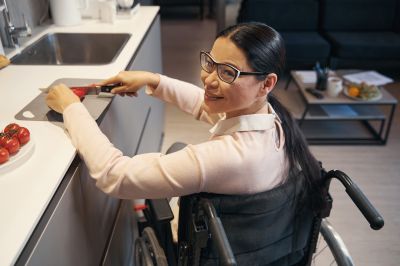Popular Products For Disability Renovations That Improve Home Accessibility
Find out which innovative products are favored for creating safer, more functional living environments for disabled individuals.
 Renovating a home to accommodate individuals with disabilities requires careful planning and the selection of appropriate products that enhance safety, accessibility, and independence. From entryways to bathrooms and living spaces, a wide range of specialized products can significantly improve daily living experiences. These products are designed to address various mobility challenges, ensuring that residents can navigate their environment with greater ease and confidence. When considering renovations, it is important to evaluate the specific needs of the individual and select solutions that provide both functionality and comfort.
Renovating a home to accommodate individuals with disabilities requires careful planning and the selection of appropriate products that enhance safety, accessibility, and independence. From entryways to bathrooms and living spaces, a wide range of specialized products can significantly improve daily living experiences. These products are designed to address various mobility challenges, ensuring that residents can navigate their environment with greater ease and confidence. When considering renovations, it is important to evaluate the specific needs of the individual and select solutions that provide both functionality and comfort.
Top Overall Option
Adjustable Height Shower System
An adjustable height shower system offers versatile access for users with varying mobility needs. Featuring a handheld showerhead, flexible mounting options, and easy-to-use controls, it can be customized to suit individual preferences. This type of shower promotes independence and safety in the bathroom, accommodating different heights and transfer needs without compromising functionality.
Types of Products For Disability Renovations
Wheelchair-Accessible Doorways
Widened doorframes and automatic door openers facilitate easier entry and exit for wheelchair users.
Grab Bars and Handrails
Strategically placed grab bars provide support and stability in bathrooms and hallways.
Walk-In Showers and Tub Modifications
Accessible showers and tubs with low thresholds improve safety and ease of use.
Lowered Countertops and Accessible Kitchen Fixtures
Kitchen modifications allow easier access to appliances and workspaces for individuals with mobility challenges.
Elevating and Adjustable Beds
Beds that can be raised or lowered assist with transfers and improve comfort.
Non-Slip Flooring Solutions
Flooring with slip-resistant surfaces reduces fall risks in high-traffic and wet areas.
Stair Lifts and Ramps
Stair lifts and portable ramps enable safe navigation between different levels of the home.
Visual and Hearing Aids
Enhanced lighting, contrasting colors, and auditory alerts support sensory impairments.
Transfer Aids and Supportive Seating
Transfer boards, chairs with armrests, and supportive seating help with mobility and comfort.
Accessible Appliances
Low-height refrigerators, ovens, and microwave units improve usability for all users.
Smart Home Automation Devices
Voice-controlled lighting, thermostats, and door locks enhance independence and convenience.
Ergonomic Furniture
Furniture designed for easy transfer and ergonomic support promotes comfort and safety.
Popular Choices
A shower designed with safety features and easy entry appeals to many seeking accessible bathroom solutions.
Portable or permanent ramps facilitate wheelchair access at entrances and thresholds.
Beds that can be raised or lowered support transfers and comfort for users with mobility needs.
Complete grab bar kits provide safety and support in key areas of the home.
Hands-free door opening systems improve accessibility for individuals with limited mobility.
Flooring with slip-resistant properties enhances safety in wet and high-traffic areas.
Lowered and pull-out cabinets make kitchen essentials easier to reach and organize.
Lifts that provide safe passage between floors are popular for multi-level homes.
Devices that provide visual cues assist users with hearing impairments.
Supportive chairs aid in safe transfers from wheelchair to seating or bed.
Smart home products controlled by voice commands increase independence.
Comfortable, supportive furniture tailored for easy transfers and prolonged sitting.
Accessibility modifications often begin with doorways and pathways. Widening doorframes or installing automatic door openers can facilitate easier access for wheelchairs or walkers. Flooring choices also play a crucial role; non-slip surfaces reduce the risk of falls and provide a stable footing. In bathrooms, safety is paramount, and the installation of grab bars, walk-in showers, and adjustable-height fixtures can make a significant difference. Kitchen adaptations, such as lowered countertops and accessible appliances, enable greater independence during meal preparation.
Lighting and visual aids are additional considerations that enhance safety and usability. Bright, well-placed lighting reduces shadows and improves visibility, while contrasting colors on walls and fixtures can assist those with visual impairments. Furniture and seating options that are ergonomic and easy to transfer into and out of also contribute to a more accessible home environment. Ultimately, selecting the right products for disability renovations involves balancing safety, practicality, and personal preferences to create a space that is welcoming and functional for all residents.
Key Buying Considerations
- Assess the specific mobility and safety needs of the individual to select appropriate products.
- Ensure products meet relevant safety standards and certifications for accessibility.
- Consider the ease of installation and whether professional help is required.
- Evaluate the durability and maintenance requirements of the products.
- Look for adjustable features that can be customized to individual preferences.
- Prioritize non-slip surfaces and safety features in high-risk areas like bathrooms and kitchens.
- Check compatibility with existing home infrastructure and layouts.
- Consider the size and space requirements to ensure proper fit and functionality.
- Review user reviews and ratings for insights into product performance and reliability.
- Factor in the overall budget while balancing quality and safety features.
- Think about future needs; select adaptable products that can evolve with changing requirements.
- Consult with healthcare professionals or occupational therapists for tailored recommendations.
- Plan for easy access to controls and switches, especially for users with limited dexterity.
- Ensure aesthetic compatibility with the home environment to encourage regular use.
- Verify warranty and customer support options for ongoing assistance.
This page contains affiliate links. We may earn a commission if you purchase through these links, at no additional cost to you.
